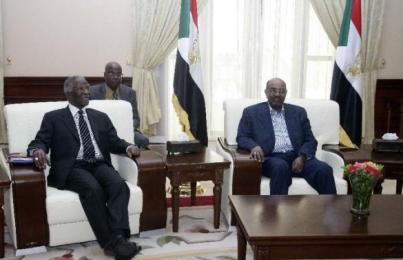African Union mediator, Sudanese officials discuss resumption of peace talks
December 20, 2016 (KHARTOUM) – The African Union chief mediator Thabo Mbeki arrived to Khartoum on Tuesday where he discussed with President Omer al-Bashir and the government negotiators ways to resume peace talk with the opposition groups.

The U.S. special envoy, German government and recently Ugandan President Yoweri Museveni during the past three months facilitated a number of informal meetings between the warring parties in the Blue Nile, South Kordofan States and Darfur region but no breakthrough has been reached.
Following his arrival, Mbeki met first with the Presidential Assistant Ibrahim Mahmoud Hamid who leads the negotiations with the SPLM-N, and State Minister Amin Hassan Omer the government chief negotiator for Darfur, before to meet al-Bashir.
Following his meeting with Mbeki, Hamid told reporters that his government was committed to achieve peace in the Two Areas and Darfur, reiterating the government readiness to sign any deal that would lead to peace in Sudan.
He pointed to the declaration of unilateral cessation of hostilities by President al-Bashir, saying the government gave a chance for peace.
“I think that more than three decades of war, enough to convince those who seek to achieve their goals by using guns, according to an agenda that does not serve the interests of Sudan,” he said.
However the doors are still open to reach peace, to join the national dialogue and “the constitutional conference that they are talking about,” he added.
The government-led dialogue process was concluded last October. The National Document approved by the participants provides to form an inclusive transitional government headed by a prime minister and to represent the opposition groups in a constituent assembly to vote a new constitution.
For his part, the head of the government negotiating team for peace in Darfur said the government is ready for a new round of talks, and called on the holdout armed groups to be realistic and to abandon “wishful thinking”, as he said.
He further said the resumption of talks depends on the consultations that Mbeki is conducting with the government and the other parties, stressing that “the government did not give up the search for peace”.
During the informal consultations held in Addis Ababa last month, the government, and armed groups in Darfur achieved some progress on the cessation of hostilities and humanitarian aid files but are still at odds on the Doha Document for Peace in Darfur. The government sticks to its position that it is the only possible framework to negotiate a deal.
PRESSING ISSUE
Following his meeting with the Sudanese president, Mbeki stated that he discussed with al-Bashir the cessation of hostilities, as a pressing issue now and pointed it is linked with the humanitarian access in the Two Areas and Darfur.
Last October, al-Bashir announced a two-month truce and called on the armed groups to join the dialogue process. The unilateral cessation of hostilities will expire on 11 January 2017.
He further said that he meeting discussed the national dialogue, its outcome and how to implement it with the Sudanese opposition.
Mbeki emphasized that the High-Level Implementation Panel will do its utmost to broker solutions to the problems of Sudan.
The African Union mediator also met with a delegation of the opposition Future Forces for Change (FFC) led by Fhazi Salah al-Din Attabani to discuss the political situation and the way forward for peace and democratic change.
In a press statement extended to Sudan Tribune after the meeting, the FFC said Mbeki briefed them on the outcome of his meetings with the government officials.
The opposition alliance further said they briefed the visiting mediator about the incommunicado detention of a number of their members by the security service adding they ignore their whereabouts and their families are not allowed to meet them.
The opposition group which calls to ensure public freedoms, informed the African Union mediator about the censorship of the Sudanese newspapers, pointing that the lack of conducive environment makes useless talk about the national dialogue and its outcome.
(ST)
